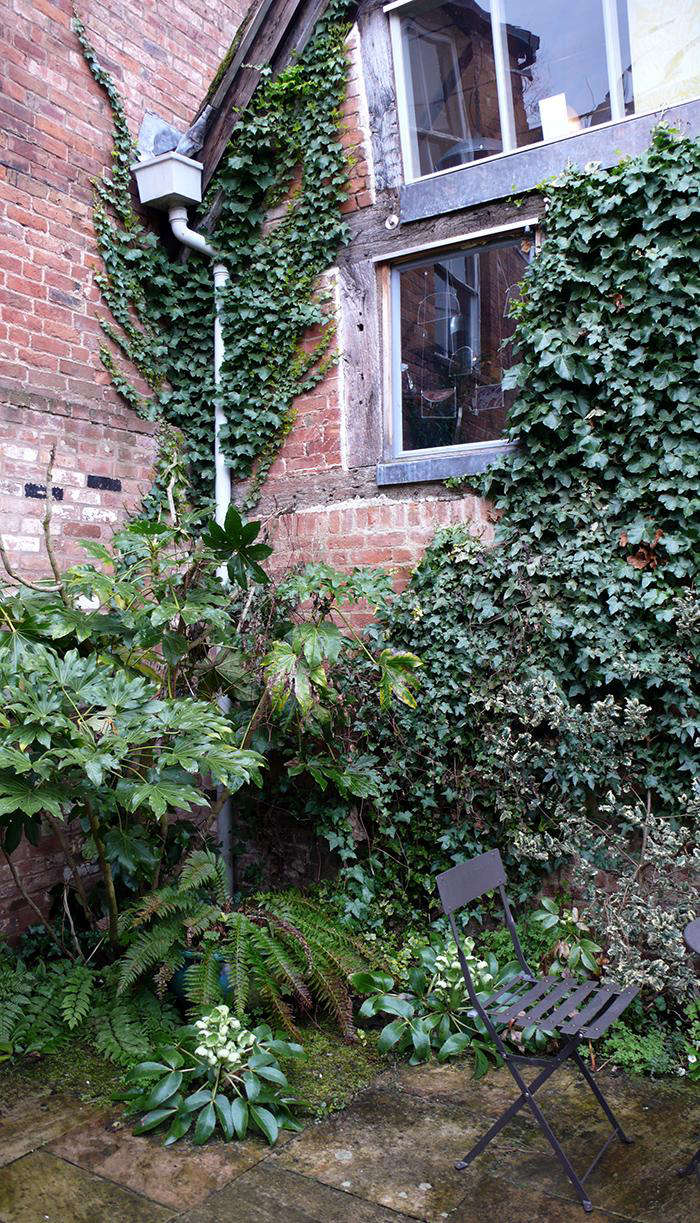Those seeking out Tinsmiths, in the market town of Ledbury, Herefordshire, should turn down an alley off the High Street and walk with some determination to the end, before encountering a kind of space ship, designed to meet all upholstery needs.
The confident mix of fabric, prints, and lighting tells you that not only will your soft furnishing dilemmas be solved but so will quandaries relating to artwork and lighting. Before reaching this structure however, it may be tempting to take a look around the old tinsmith workshop, a brick and beam original found halfway down the alley. Both buildings work in tangent, one selling services, the other sundries. The tinsmithery has been shored up with the same kind of robust materials used in the upholstery pod, while retaining its original charm. “When we close the old tinsmiths building at night,” says proprietor Phoebe Clive, “it looks like it did when we first found it.”
Photographs by Kendra Wilson.

Above: The view of the old tinsmiths from the newer building. Alex Clive, Phoebe’s husband, is an enthusiastic builder of staircases and metal and glass buildings. He has made this space, with its inter-relating buildings, into a hard-working double act.

Above: A north-facing courtyard is filled with plants that thrive in wet, semi-shaded conditions.

Above: “Tinsmiths’ values are about timelessness.” says Phoebe Clive. “Curtain-making is very belt-and-braces, with its linings and interlinings,” she continues. “Our curtains are not going to wear out; you should expect them to last a generation.”

Above: Phoebe began making curtains when she was 12 and went on to study furniture at Leeds College of Art. “One thing I learnt at Leeds was to ask myself: ‘Does this have a lasting quality and value?'” First and foremost upholsterers, Tinsmiths’ fabric includes St Judes and Ian Mankin. Of the latter Phoebe says: “It’s economical, it never goes out of fashion and you never get sick of it.” And the quality is superlative.

Above: Phoebe soon realized that she was more interested in fabric over sewing per se: “Curtain-making is more about maths.” A passion for textiles and woven fabrics goes hand in hand with an interest in prints, and featured artists are Mark Hearld and Angie Lewin, who also happen to design fabric.

Above: Olive wood products, with a view over Tinsmiths Alley. The walls of the alley are plastered with posters from the local letterpress printer and all the printed goods at the shop are printed locally in the old style. Tinsmiths’ letterpress calendar is interlinked with the blog: this is how organized and creative Phoebe is.

Above: Haberdashery from Merchant & Mills sold here. Exquisite pins and needles are supplemented with sewing kits containing récherché fabric like this dark green weather-resistant oilskin (also known as Barbour material).

Above: Blanket and throws are a feature of both buildings at Tinsmiths. Shown here: double Welsh blankets, £220.

Above: Ledbury is a classic English market town, with a covered market on stilts (seen above). in the foreground is the giant pair of scissors which hangs over Tinsmiths Alley. In earlier times an oversized copper kettle hung in this spot, advertising the mending of kettles by the tinsmiths.
Exhibitions are a regular event, the most recent celebrating tile art, featuring Lubna Chowdhary. N.B.: See Sculptural Tiles from a London Ceramicist.
Heading over towards Wales? Why not stop at nearby Baileys Café in Herefordshire as well.












Have a Question or Comment About This Post?
Join the conversation (0)